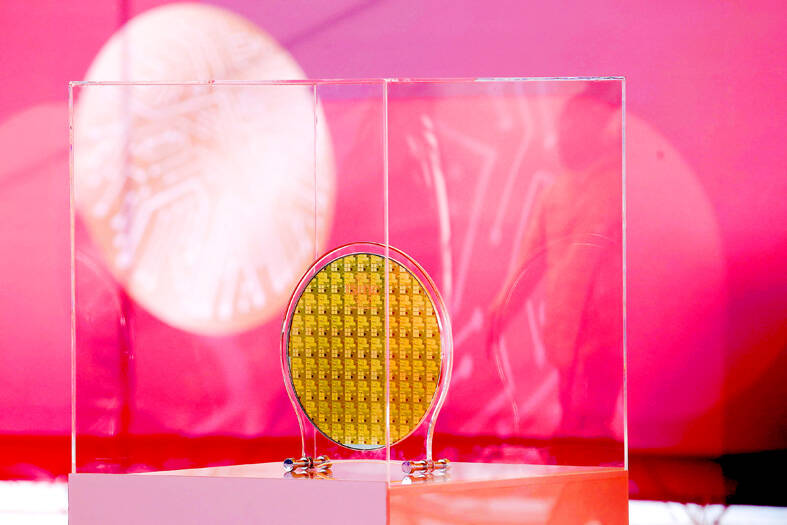Silicon wafer supplier Formosa Sumco Technology Corp’s (台勝科) board of directors yesterday approved a plan to distribute a bigger cash dividend of NT$7.3 per common share this year, due to its solid earnings performance last year.
Formosa Sumo shareholders received a cash dividend of NT$2.2 per share last year.
Net income last year more than tripled to NT$4.82 billion (US$157.55 million) from NT$1.41 billion in 2021 — the company’ best performance since 2018. That translated into earnings per share of NT$12.43, an increase from NT$3.64 the previous year.

Photo: Ann Wang, Reuters
The proposed cash dividend represents a payout ratio of 58.73 percent. It also comes with a dividend yield of 4.69 percent based on the company’s closing share price of NT$155.5 yesterday.
The proposal is subject to shareholders’ approval at an annual general meeting on June 15 in Taipei, the company said.
Gross margin last year expanded to 37.7 percent from 20.98 percent in 2021 — the highest it has been in four years, Formosa Sumco said in a filing with the Taiwan Stock Exchange yesterday.
Gross margin dropped to 36.83 percent last quarter from 38.59 percent in the third quarter of last year.
During the fourth quarter of last year, net profit contracted more than 35 percent to NT$995.49 million from NT$1.54 billion in the third quarter, due to demand for 12-inch wafers being weak as customers had entered an inventory correction cycle, Formosa Sumco said.
The company told investors in November last year that its 12-inch and 8-inch fabs would be fully utilized in the fourth quarter, but it would adjust its product lineup after major customers signaled a slowdown in wafer demand amid rising inventory and sagging end-market demand for notebook computers and smartphones.
Last year as a whole, the company saw its revenue surge 34.67 percent from NT$12.17 billion in 2021 to an all-time high of NT$16.39 billion.
During the first two months of this year, the company accumulated NT$2.4 billion in revenue, down 1.2 percent from NT$2.43 billion during the same period last year.
GlobalWafers Co (環球晶圓), the world’s third-largest silicon wafer supplier, yesterday reported that its revenue in the first two months of this year rose 12.66 percent to NT$11.91 billion from NT$10.57 billion in the same period last year.
The company plans to release financial details and give its business outlook during a virtual investors’ conference on Tuesday next week.

COMPETITION: AMD, Intel and Qualcomm are unveiling new laptop and desktop parts in Las Vegas, arguing their technologies provide the best performance for AI workloads Advanced Micro Devices Inc (AMD), the second-biggest maker of computer processors, said its chips are to be used by Dell Technologies Inc for the first time in PCs sold to businesses. The chipmaker unveiled new processors it says would make AMD-based PCs the best at running artificial intelligence (AI) software. Dell has decided to use the chips in some of its computers aimed at business customers, AMD executives said at CES in Las Vegas on Monday. Dell’s embrace of AMD for corporate PCs — it already uses the chipmaker for consumer devices — is another blow for Intel Corp as the company

MediaTek Inc (聯發科) yesterday said it is teaming up with Nvidia Corp to develop a new chip for artificial intelligence (AI) supercomputers that uses architecture licensed from Arm Holdings PLC. The new product is targeting AI researchers, data scientists and students rather than the mass PC market, the company said. The announcement comes as MediaTek makes efforts to add AI capabilities to its Dimensity chips for smartphones and tablets, Genio family for the Internet of Things devices, Pentonic series of smart TVs, Kompanio line of Arm-based Chromebooks, along with the Dimensity auto platform for vehicles. MeidaTek, the world’s largest chip designer for smartphones

TECH PULL: Electronics heavyweights also attracted strong buying ahead of the CES, analysts said. Meanwhile, Asian markets were mixed amid Trump’s incoming presidency Taiwan Semiconductor Manufacturing Co (TSMC, 台積電) shares yesterday closed at a new high in the wake of a rally among tech stocks on Wall Street on Friday, moving the TAIEX sharply higher by more than 600 points. TSMC, the most heavily weighted stock in the TAIEX, rose 4.65 percent to close at a new high of NT$1,125, boosting its market value to NT$29.17 trillion (US$888 billion) and contributing about 400 points to the TAIEX’s rise. The TAIEX ended up 639.41 points, or 2.79 percent, at 23,547.71. Turnover totaled NT$406.478 billion, Taiwan Stock Exchange data showed. The surge in TSMC follows a positive performance

FUTURE TECH: Nvidia CEO Jensen Huang would give the keynote speech at this year’s Consumer Electronics Show, which is also expected to highlight autonomous vehicles Gadgets, robots and vehicles imbued with artificial intelligence (AI) would once again vie for attention at the Consumer Electronics Show (CES) this week, as vendors behind the scenes would seek ways to deal with tariffs threatened by US president-elect Donald Trump. The annual Consumer Electronics Show opens formally in Las Vegas tomorrow, but preceding days are packed with product announcements. AI would be a major theme of the show, along with autonomous vehicles ranging from tractors and boats to lawn mowers and golf club trollies. “Everybody is going to be talking about AI,” Creative Strategies Inc analyst Carolina Milanesi said. “From fridges to ovens